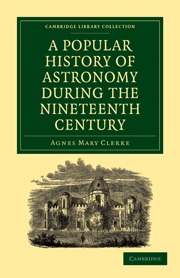Book contents
- Frontmatter
- PREFACE
- Contents
- INTRODUCTION
- Part I PROGRESS OF ASTRONOMY DURING THE FIRST HALF OF THE NINETEENTH CENTURY
- CHAPTER I FOUNDATION OF SIDEREAL ASTRONOMY
- CHAPTER II PROGRESS OF SIDEREAL ASTRONOMY
- CHAPTER III PROGRESS OF KNOWLEDGE REGARDING THE SUN
- CHAPTER IV PLANETARY DISCOVERIES
- CHAPTER V COMETS
- CHAPTER VI INSTRUMENTAL ADVANCES
- Part II RECENT PROGRESS OF ASTRONOMY
- INDEX
CHAPTER II - PROGRESS OF SIDEREAL ASTRONOMY
Published online by Cambridge University Press: 07 September 2011
- Frontmatter
- PREFACE
- Contents
- INTRODUCTION
- Part I PROGRESS OF ASTRONOMY DURING THE FIRST HALF OF THE NINETEENTH CENTURY
- CHAPTER I FOUNDATION OF SIDEREAL ASTRONOMY
- CHAPTER II PROGRESS OF SIDEREAL ASTRONOMY
- CHAPTER III PROGRESS OF KNOWLEDGE REGARDING THE SUN
- CHAPTER IV PLANETARY DISCOVERIES
- CHAPTER V COMETS
- CHAPTER VI INSTRUMENTAL ADVANCES
- Part II RECENT PROGRESS OF ASTRONOMY
- INDEX
Summary
We have now to consider labours of a totally different character from those of Sir William Herschel. Exploration and discovery do not constitute the whole business of astronomy; the less adventurous, though not less arduous, task of gaining a more and more complete mastery over the problems immemorially presented to her, may, on the contrary, be said to form her primary duty. A knowledge of the movements of the heavenly bodies has, from the earliest times, been demanded by the urgent needs of mankind; and science finds prosperity, as in many cases it has taken its origin, in condescension to practical claims. Indeed, to bring such knowledge as near as possible to absolute precision has been defined by no mean authority as the true end of astronomy.
Several causes concurred about the beginning of the present century to give a fresh and powerful impulse to investigations having this end in view. The rapid progress of theory almost compelled a corresponding advance in observation; instrumental improvements rendered such an advance possible; Herschel's discoveries quickened public interest in celestial inquiries; royal, imperial, and grand-ducal patronage widened the scope of individual effort. The heart of the new movement was in Germany. Hitherto the observatory of Flamsteed and Bradley had been the acknowledged centre of practical astronomy; Greenwich observations were the standard of reference all over Europe; and the art of observing prospered in direct proportion to the fidelity with which Greenwich methods were imitated.
- Type
- Chapter
- Information
- Publisher: Cambridge University PressPrint publication year: 2010First published in: 1885



